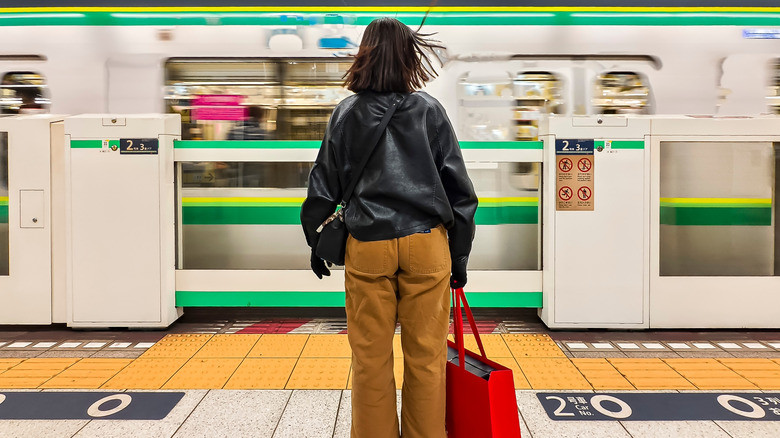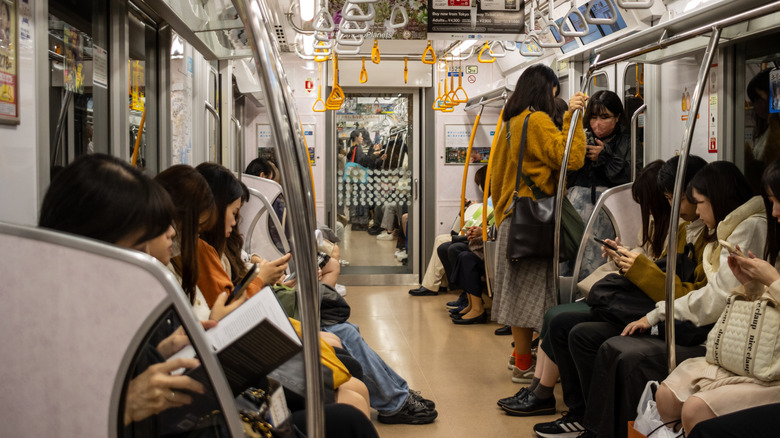Locals In Japan Feel Disrespected When This Unspoken Train Rule Is Broken By Tourists
Japan's rail system is renowned worldwide for its efficiency and cleanliness. Consistently ranked at the top of global transportation surveys — thanks to trains known for their extraordinary punctuality, modern amenities, and customer-first approach to service — the level of reliability is mind-blowing. Especially when you consider that the system itself thrives on its commitment to passenger experience, with trains that arrive and depart on schedule, women-only train cars for solo female passengers to feel safer, and a vast network that makes rail travel the most convenient option for most.
That said, of all the infrastructure achievements that Japan's trains are known for, there's one very specific social element that highlights the country's reputation for consideration and collective harmony. Because, among Japan's unwritten train etiquette rules — like always hanging your backpack on the front, or avoiding eating messy foods — there's really nothing more sacred or fundamental than the expectation of complete silence during a train journey. Better yet, for Japanese locals, this isn't simply a preference — it's a fundamental aspect of social harmony that, when disrupted by unaware tourists, can lead to a genuine feeling of disrespect and discomfort.
Put simply, the "culture of silence" on Japanese trains stems from a deep respect for shared public spaces, as well as deep consideration for fellow passengers. Whether commuting to work or traveling between cities, most Japanese travelers think of their train time as a precious moment to rest, reflect, or prepare for the day ahead — and silence plays a huge role in just how well they're able to achieve this mental space. A phenomenon that's even evidenced on social media, where videos show people silently filing through bustling stations in a striking contrast between the crowded conditions and the near-complete absence of conversation.
Why silence matters so much on Japanese trains
If you're hoping to be a considerate tourist while visiting Japan, one of the most important things you need to know is that the silence on local trains serves multiple cultural and practical purposes. For one, Japan is a densely populated country — with roughly 875 people per square mile — where apartments are small and work environments can be incredibly demanding. As such, train journeys typically offer a rare moment of mental decompression that helps locals maintain a healthy level of balance and well-being. That way, whether someone's reviewing work documents, preparing mentally for an important meeting, or simply looking for a moment of peaceful reflection, they know they'll be able to do so without the extra effort of filtering out additional background noise.
Similarly, this silence also reflects the deeply rooted Japanese concept of "wa" (harmony) that prioritizes group well-being over individual expression. In a culture where "reading the air" (kuuki wo yomu) means perceiving others' needs without explicit communication, keeping quiet on trains demonstrates a high level of social awareness that's well-received in Japan.
When tourists break this unspoken rule by engaging in loud conversations or playing media without headphones, the entire experience can feel particularly jarring against the carefully maintained backdrop of tranquility. As a result, most Japanese commuters consider the disruption more than a simple annoyance. Instead, they see it as fundamental disregard for local customs — an especially significant insult against their core values of mutual respect, social harmony, and consideration for others. And, while most locals might be too polite to openly express their discomfort, the palpable tension from when someone's being too loud for comfort is unmistakable.

